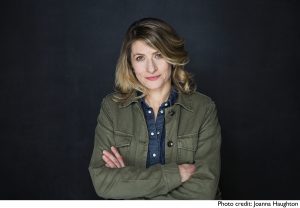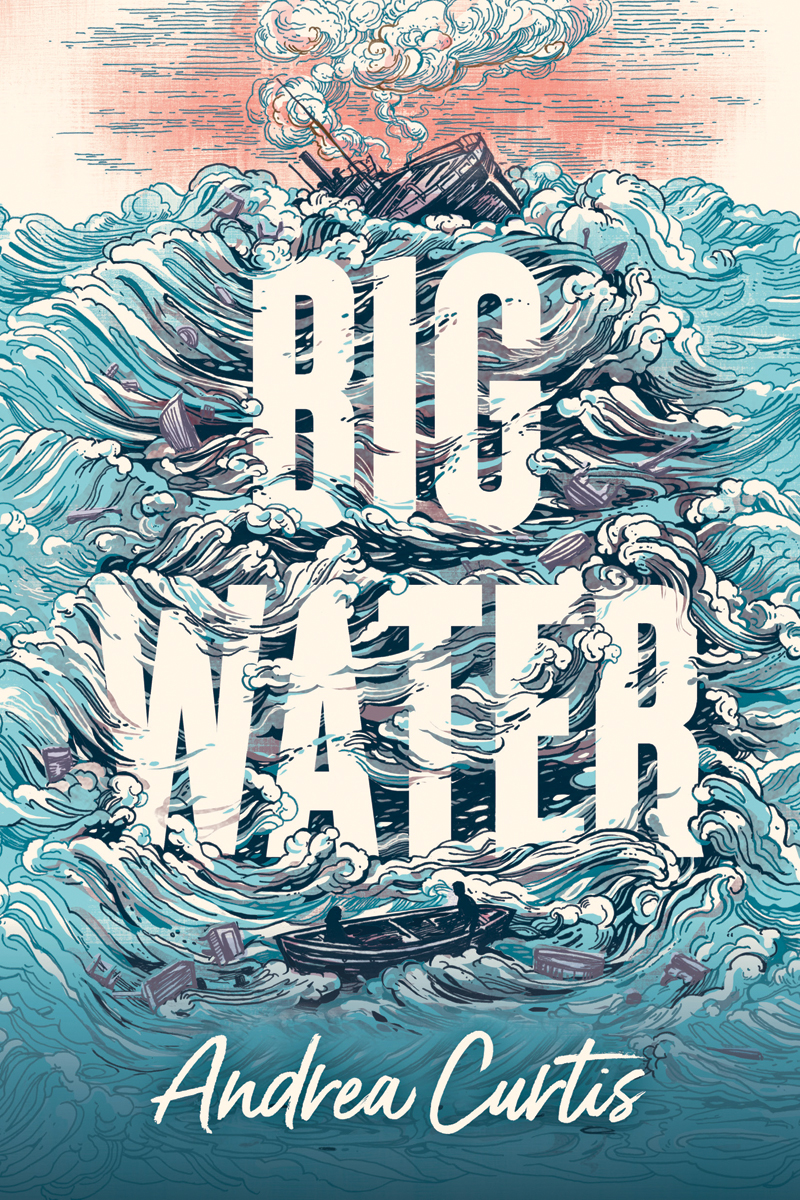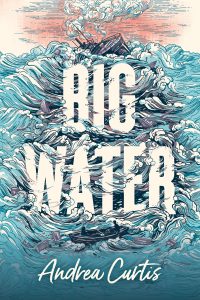Big Water: Seventeen-year-old Christina McBurney, grieving the loss of her twin brother, Jonathan, to consumption, runs away from her Parkdale home and secures passage on the SS Asia, on its way to Sault Ste. Marie. But when the overloaded and top-heavy steamship sinks in a violent storm, Christina must figure out a way to work together with the only other survivor, a brooding young man with a likely criminal past.
What planning and research did you do for you book?
My first book was adult creative nonfiction called Into the Blue about another shipwreck on Georgian Bay. That boat also sank in a fall storm. The captain and owner was my great grandfather, and in the book I explored the toll that disaster took on my family and their small community. I did years of research for it and thought I’d never again write about shipwrecks. But the story of the Asia—which I’d read about in my research— stuck with me. I continued to read more about the wreck when I decided to write this novel, but I stopped myself from going into much more depth because I didn’t want to be trapped by the urge to show all the fascinating facts I’d uncovered! I very much wanted the novel to be set in the past but feel universal.
What is your ideal writing environment?
I am a creature of habit. I find it hard to focus away from my home office with a big south-facing bay window. There are few distractions (unless my family is home!) and I can readily go where I need to go in my imagination. But I have also worked at my family’s Georgian Bay cottage. There, I set up with a laptop on a card table facing the bay watching the wind stir the water into whitecaps, waves beating the shore. While it’s infinitely more distracting, it is a glorious perch from which to write.
How do you decide on names for your characters?
The characters in my book are based on real people, but I have imagined complete back stories for them and put words into their mouths that they likely never spoke. As a result, I felt it was unfair to keep the names of the actual teenage shipwreck survivors: Duncan and Christy Ann. The names also sounded a bit olde tyme-y and I wanted the story to appeal to contemporary teenagers, so I changed them to something plausibly historical but less fraught: Daniel and Christina.
Do you ever get writer’s block? What do you do to overcome it?
I have never had an extended period of writer’s block but there are many days when I feel as if I am going nowhere with my writing. Over the years, I have come to the conclusion that these fallow periods are normal, that just like a field that goes uncultivated for a season, there is much going on below the surface. I tend to emerge from these times humbled but also energized with new creativity and desire to write.
What was the last novel you read? Why did you choose it? What did you think of it?
I’ve been reading a lot of YA fiction lately, partly because I am writing it and partly because I like to be able to recommend books to the Grade 6 kids I teach in my weekly creative writing workshop. I recently finished John Green’s latest, Turtles All the Way Down, Lynda Mulally Hunt’s Fish in a Tree and Auggie and Me: Three Wonder Stories by RJ Palacio. I enjoyed them all, conscious always of the ways that adults writing YA imagine (and sometimes misjudge) their teenage readers’ interests and enthusiasms.
Do you remember your dreams? Do they ever become inspiration for your writing?
I rarely remember my dreams but most of my fiction begins from a single startling dream-like image—a train barrelling down the tracks about to hit a massive elephant; the front page of a newspaper with a close-up image of three faces, two boys and a baby squished between them. These images seem to appear in my mind when I least expect it. It might be during yoga or in the shower or out for a run. These images are powerful and overwhelming. They feel like a gift and they become my guiding idea through the writing process.
In an alternate universe, what would your dream career be?
I sometimes think in an alternative universe I would have studied medicine and become a doctor. I come from a long line of medical people who worked long hours in demanding positions and it didn’t look very appealing to me. Yet, I maintain a strong interest in medicine and health and well-being. I wonder what it would be like to be a doctor working in an emergency department or maybe in a field hospital with Doctors Without Borders.
What types of conversations do you hope will come out of your book?
I hope Big Water encourages conversations about the role of history in contemporary life. I hope readers will ask questions about the changing roles and expectations for women and girls, and the representation of Indigenous people in historical records. I also hope readers find that Big Water convinces them historical writing can be as fascinating and exciting as contemporary stories.
Big Water is available now!
 Andrea Curtis is the award-winning writer of several books for young people and adults, including Into the Blue, about her great-grandfather, a steamboat captain who disappeared on Georgian Bay in the early twentieth century. A graduate of McGill University in Montreal, Quebec, Andrea lives in Toronto, Ontario, with her husband and their two sons. For more information, visit www.andreacurtis.ca.
Andrea Curtis is the award-winning writer of several books for young people and adults, including Into the Blue, about her great-grandfather, a steamboat captain who disappeared on Georgian Bay in the early twentieth century. A graduate of McGill University in Montreal, Quebec, Andrea lives in Toronto, Ontario, with her husband and their two sons. For more information, visit www.andreacurtis.ca.


